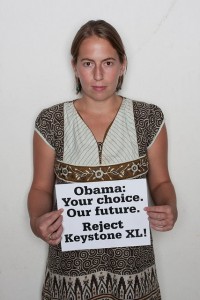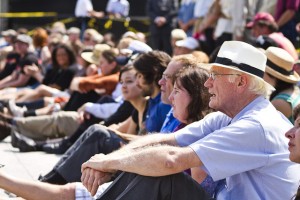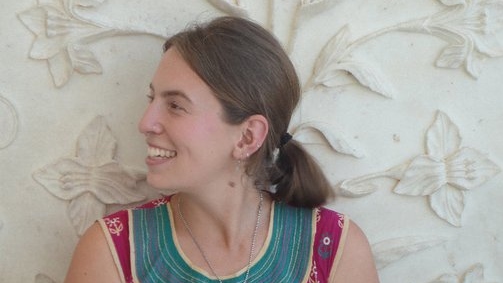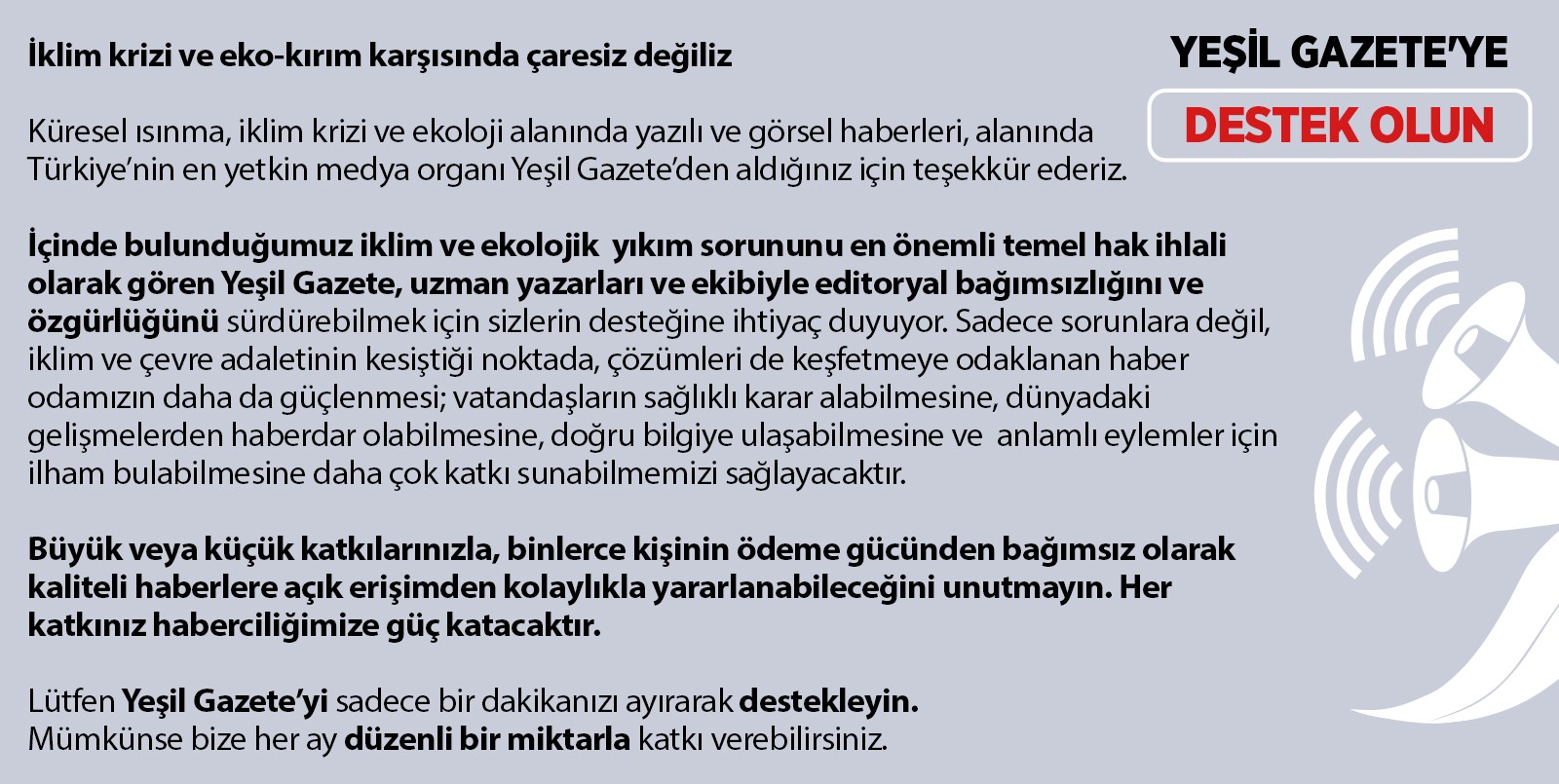(Bu söyleşinin Türkçe çevirisine bu bağlantıdan ulaşabilirsiniz)
Meghan Kallman is only one of the 1252 climate activists who were detained during the Tar Sands Action protests in Washington DC between August 20 and September 3. They were at a peaceful action in front of the White House in order to prevent approval for a pipeline that is meant to carry petroleum extracted from Canada’s tar sands to US refinaries. According to notable climate scientist and one of the activists James Hansen, the building of this pipeline will guarantee a 500 ppm carbondioxide concentration in the atmosphere, placing the planet in face of a hard to imagine climate catastrophe. Their action was tremendously successful in bringing the issue to the public’s attention. We talk with Meghan about this mass action, activism and about climate change.
…
-Meghan, I’ve previously known you as a graduate student and a community organizer dedicated to local sustainable living. Tell us how you heard of and got involved in the Tar Sands Action. Did you just respond to the call or were you approached as representing a community or group?

I heard about the Tar Sands Action through a number of different listservs and activist organizations that I’m part of. It came via many different channels at once (very good marketing on the part of the organizers!). I also have a dear friend and partner-in-climate-activism, and we have been discussing it for several months. We had planned to go down together, but logistics prevented that from happening and so I wound up going alone. While there were certainly protesters who came as a part of a group or representing a group, many also came alone, with partners or spouses, or with friends or co-workers. That to me is tremendously powerful.
-Why did you oblige? What made you want to take a stand?
I think that this is an important juncture in the movement. Obama won support from environmentalists like me during his election campaign based on promises to make real differences in US environmental policy, and to propel us towards renewable energy sources and green jobs. That hasn’t happened to the degree that we had all hoped for, and a lot of us are extremely disappointed. Granted, this has been a difficult term with respect to the economy and all the wars that the US is engaged in, but the climate is of critical importance and we cannot keep sidelining it if we want any sort of a future for ourselves. The climate bill failed earlier in Obama’s term, and many of us are very disappointed in how he has been dealing with these issues. The proposed Keystone XL pipeline is an issue that does not have to go through Congress; it is something that will be decided directly by the Obama administration itself. Which is why it’s a good point of contact, and a good time and place to hold Obama himself accountable.
-All right. On this note, everyone acknowledges the holistic effect of climate change but for most climate activists, one or another aspect of climate change has a drastic effect on our conscious that we feel a need to scream for change. what touches you?
This is not just a question of U.S. politics and environment–this is a social justice issue as well.
Poor people most often feel, disproportionately, the impacts of climate change. They are the first to go without water, without food, and to suffer the adverse impacts of natural disasters. And so this pipeline becomes a focal point for different groups who work on different social and environmental justice issues, and they are all able to converge on an issue of common concern.
In part, I joined the action because I would like to have children, and I would like to be able to entrust to them a world that has not been completely devastated by the effects of climate change. I would like for them to know what ice caps are, and how it feels to breathe clean air. I grew up in the countryside, and I want those things for myself as well. Energy and climate issues are absolutely the challenge of this generation, and I am, quite frankly, excited to be a part of facing and addressing it.
-So you volunteered for the action, and then? tell us a story, how did things progress? It is a huge organization to bring literally a couple of thousand people from all over the US together in a coordinated and consistent action. How did you observe this works? What are the steps?
I was very impressed by how well organized this action was. TarSandsAction, which is spearheaded, as you probably know, by Bill McKibben at 350.org and others, designed and organized the trainings with the help of a few other social and environmental justice organizations. They basically sent out a call through all their channels—and I’m not part of the organization itself, so I don’t know exactly how they did that. But I got announcements from all of my social justice and environmental listservs, from friends, on Facebook. I signed up online, and then they send you an email with some information about the action and about the training.The organizers wanted everyone planning on attending the action to also attend a training on non-violent direct actions the evening prior to their sit-in day, and that was a very useful thing for me. We met the other folks who would be sitting-in with us (in my case, about 140 other people), which helped us develop some solidarity and get more excited. We sort of bolstered each other, and since this was my first arrest, that was important to me as well. We heard perspectives from some indigenous community activists whose land would be affected by this pipeline, and from Bill McKibben, who is one of the main voices in the climate movement. We were briefed on how the sit-in day was going to go, on what would likely happen, on what the probable outcomes were (legal and otherwise), and we were asked to find “buddies”—another activist to keep an eye on, to be arrested with, and to basically look out for. We did a rehearsal “arrest”, which was to help prepare us for what the arrest process itself would look like, and to help call up any potential problem areas, or moments that were apt to be especially frightening. Several religious communities in the DC area donated space for the trainings. We had a communal dinner, and plenty of opportunity to mingle, meet each other, and ask questions.
-And on what day did you take part in the action?, and with what group? From what I’ve gathered, usually it is by region, right? Who was with you in terms of well known names?
I attended a training on August 31, and sat in on September 1. As far as I know the actions are not grouped by region, but rather by whoever is available to come. This is, I think one of the reasons the actions have been able to draw so many people—because they took place over several weeks, folks were able to figure out how to fit them into their own schedules. It seems like a new and effective way of organizing large-scale actions. Certain people do come in groups, but it’s my understanding that it’s more common for folks to come representing their group at home. On my sit-in day, we had a representative from a labor union, and from different environmental and faith-based organizations all over the country. We also had several folks from Canada, who came down and risked arrest in the US to stand in solidarity with us. International arrests can get very problematic, and the fact that they did that was tremendously meaningful.
Josh Fox, who directed Gasland was sitting-in with my group that day. James Hansen, NASA’s top climate scientist, was arrested two days before me, along with actress Darryl Hannah. Al Gore voiced his support for the action the night that I attended my training. The big names have been coming, and coming. But what makes me the most proud is all of the non-big names that
came. I was in the paddy wagon with a 73-year-old grandmother from Virginia, a college student from DC, a teacher from New York. An elderly woman, in a wheelchair, sat in with us and was arrested on her birthday.

-When we take NVDA type actions here, the police knows it is passive but still usually roughs us up slightly on the way to the bus. What was your experience? did they talk to you at all? What did they say?
My experience with the DC park police could not have been better, though I speak only for myself here. The police spoke pleasantly with and to us, and one woman thanked me for being so professional. Much of the credit for that goes to the action organizers, who trained us very carefully on how to facilitate processing and how to remain utterly professional and nonviolent. This professionalism, it’s important to note, is part of the tenor of the action. We are demonstrating that we are not the radicals here; the radicals are the ones who suggest that continuing to pollute our environment and egregiously endangering our climate are reasonable things to do for profit.
The highlight of my police interactions, however, was when my arresting officer–after he had driven a paddywagon full of women down to the police station–opened the back door, leaned against it, and asked us to explain to him exactly what we were protesting and why. He listened attentively and interestedly through the whole thing! So I can bet that young man went home that night and Googled the issue, which is inspiring. That he was curious and wanted to ask and was willing to ask and to listen was inspiring.
-How long were you in custody for? I was surprised to hear two days of custody time in the initial day of the action. does this still hold? Does your counsel expect litigation? How do you feel about this?
I was offered the post-and-forfeit option, which basically means that you pay $100 and forfeit your right to a trial, though you are not convicted of anything (that is, neither admitting guilt nor proclaiming innocence). I took that option, and was in custody for about four hours. The purpose of these arrests is largely symbolic, and the organizers believe (and I agree with them), that for our purposes, the arrest itself is the critical element, not how long you actually stay in jail.
The park police mistakenly believed that the protesters on the first day would be the same people who came every day, and I believe they were held longer (more than two days) as a deterrent. In fact, another dear friend who was held for those two days tells me that they were explicitly informed that their detention was in order to ‘make an example of them’, to deter future protesters. She told me that when the first day’s protesters were detained, they weren’t looking for sympathy—they just wanted company, and were thrilled to hear that the next day’s protesters went ahead and got arrested even in the face of potential jail time. They were eventually released and “no-papered,” meaning that there were no fines and no charges. The legal team has some problems with how that was handled, but I don’t know what they are planning to do.
-The Tar Sands Action has been vastly successful in terms of generating media coverage and public ownership of the issue. there have been editorials all the way to the chief editorial article of the NYT, internet coverage is phenomenal and now there are global protests in solidarity. how do you feel? do you think this may go further than the Keystone XL pipeline, or are you focused on the goal at this point?
I have been thrilled to see how large this has grown in the past few weeks. The Keystone XL issue went from being a virtual unknown to being, as you say, all over everywhere. That says to me that these tactics are appropriate to this issue. We’re deciding what to do next. Stopping the pipeline is the first goal, but generating energy, interest, and sustained commitment from all kinds of folks all over the country is very important, and it will be the continuation of this action and this movement. Becoming a public dialogue is critical. The media coverage helps us do that.
-There is a big 350 protest coming up on the 24th of this month all over the world, including a big one here in Istanbul. Do you expect something new and more powerful with the wave created by the tar sands action? Where will you be by the way?
I will be at home in Providence this month, helping to organize something here. I hope that this action has generated and will continue to generate attention and energy.
For me, one of the important pieces of this issue is that we all need to recognize and make peace with the fact that we are dependent on oil. I know that I am! I try to be to the most minimal extent possible, but I remain locked into my use of it, though my use of technology, the food I eat, the bicycle and busses that I ride to and from my commitments every day. The purpose of this movement is not to deny that, not to deny my (or anyone else’s) oil dependence. It is, rather, to help move us, as a society and as a world, towards more sustainable alternatives. To help drive that change, and to make that change something that people want rather than something they fear. To help break ourselves of this very, very destructive habit, recognizing our own individual and collective responsibilities within the system.
-How about in the longer run? Are you hopeful about political will finally being drawn together, or is it solely citizen and local action that has a chance to make a difference on the climate crisis? Do you expect anything at all from Durban? Do you even care?
One of the things that it has been difficult for me to come to terms with, as an activist, is that this “drawing together” is a long process, and that it’s not all flash in the pan. But I am hopeful. I am hopeful particularly because with this small group of people—there have been, after all, just over 1200 arrests in total—we have managed to make headlines all over the world, spur solidarity protests everywhere from Canada to New Zealand (whose protests, incidentally, shut down the Canadian embassy for the afternoon a few days ago). That is tremendously empowering, and I hope that this movement generates more of those feelings of empowerment and thus, more action. We can put this off and put this off until we reach absolute climate catastrophe, or we can pull ourselves together and deal with the climate and energy issue before we get there. The science is irrefutably behind us, and I think that the political will is following.
But this political will doesn’t happen in a vacuum—it’s wrapped up in concerns about the economy, concerns about jobs, and in the way that our political system and our corporate interests interact. So in that sense we have a much, much larger project in front of us than just stopping the development of this pipeline. Our project is to somehow build into our economic and political systems a concern for the earth on which we live, and for the environmental costs of doing business as we do. That implies many very very large changes to many systems and institutions that we take for granted, and that will be the difficult part.
-In the US you have a particularly hard job as climate activists as you are trying to turn around the most energy consuming society per capita in the world by far. in fact so much so that fossil fuel advocates in societies like Turkey – which, by the way, has had over a 120% increase in emissions since 1990, the base year for climate negotiations, and is set to be the biggest emitter in Europe in the 2020’s – still argue that the climate crisis should be solved by bringing down emissions in historically responsible areas and large emitters like China, that Turkey should maintain a fast carbon-fueled economic growth. As someone fresh out of an action to halt US emissions, how do you feel about their argument?
I think, that as the largest emitter on earth, the US has a tremendous responsibility towards cutting emissions, towards cleanup, and towards setting an example and pioneering technologies that can help meet the world’s energy needs. We made much of this mess, and I do believe that it falls on us to clean it up. I also believe, however, that it would be a mistake for China, Turkey, Brazil, India, or anywhere else to maintain carbon-fueled economic growth, because that won’t solve our energy issues over the long term and it will drastically worsen our climate problems. I understand the justice-based argument behind it and am partially sympathetic to it, at least in theory, but the earth simply won’t sustain that kind of development.
Interview: Alidost Numan – Yesil Gazete (Green Newspaper)


